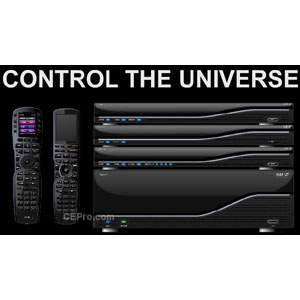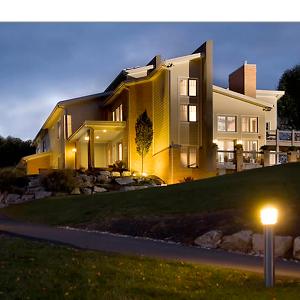
Why Energy Efficiency Starts at Home
 C.I.S. is the Carolina's #1 Authorized Retailer/Installer of Lutron & HAI Energy Saving Devices It’s time we took energy efficiency personally.
Consider the following stats:
-Over 70 percent of U.S. electricity is generated by burning coal, petroleum, or natural gas, all fossil fuels that emit carbon into the atmosphere when burned. Coal alone provides 44 percent of U.S. electricity and the majority of greenhouse gases. Source: DOE
-Homes and commercial buildings use 72 percent of U.S. electricity, and homes use 51 percent of that. Source: EPA
-There are approximately 126 million homes in the United States, which equates to an annual emission from homes alone at approximately 1.3 billion metric tons of carbon. Source: US Census Bureau 2006
-According to the National Home Energy Efficiency Program (NHEEP), the U.S. housing stock wastes more energy than any other sector in the world.
So why are environmentalists, policy makers and others focused on reducing the energy output of industry, transportation and the commercial sector? It’s true that we can make huge gains by making our power and manufacturing plants, cars and commercial buildings much more efficient. But many of us forget to include our homes in the energy efficiency equation. And this, I am convinced, is the primary reason why we are not seeing the efficiency gains we’d like in these other sectors.
A recent New York Times article, “Doing More While Using Less Power,” throws around a bunch of conflicting energy efficiency projections. And other articles on the subject typically state projections in the billions and trillions—collective numbers that few can comprehend, not to mention the fact that wildly varied projections stretch into 2020 or 2030 or 2050—times few us can comprehend, especially when most of us are trying to survive in an economically scary 2010.
The Times article also laments the fact that some businesses, while they could save millions on energy efficiency initiatives, remain hesitant to do so. “Perhaps the biggest barrier to maximizing energy efficiency is the natural reluctance of people to try something new,” the article opines.
That may well be true. In both business and politics, anything new poses risk, and risk is not typically welcome in economically troubled times.
But maybe, just maybe, the hesitation people have with all this energy efficiency stuff is that they are not personally invested in it. And of course they are—if we continue on our wasteful ways we will all have stakes in inflated energy costs and a deteriorating climate. But people don’t feel they are invested in it—and that is the problem.
The sad part is, people have reason not to be personally invested in energy efficiency: We throw incomprehensible numbers at them—billions and trillions—as well as incomprehensible terms like BTUs and kilowatt hours—and dates that extend far into the future, which more likely inhibits a sense of urgency in the matter. We say we should set policy in industry and in the commercial sector and in transportation—and soon the entire matter is in someone else’s hands—not our own. The problem becomes so much larger than each individual. Instead, we need to personalize energy efficiency and give everyone a stake in it.
The numbers above prove we should start our energy efficiency efforts in the home. So why aren’t we doing it?
The Real Prius Effect
Say what you will about the Toyota Prius—I say you can do the planet better by turning lights off in your home—but the hybrid electric car does one thing amazingly well: It puts energy efficiency in the face of its driver, with a large screen-based readout that makes saving gasoline like a video game. The Prius may not be the best choice for saving the planet, but it manages to personalize energy efficiency and gives its users a real stake in it.
And here’s another story, which for many actual people may be far more convincing than a bunch of incomprehensible numbers. I was at a Little League game this summer, the day an energy-efficiency appliance rebate program ran in my state, and the very blue-collar, probably not so energy-efficient granddad in front of me said, “Yeah, we bought a new washing machine and a new refrigerator—and you know what? It’s going to use half as much electricity as the one we had!” He was as excited about the energy efficiency as he was about his rebate—if not more so. And the funny thing was, the scene repeated itself the very next week with another person who suddenly started thinking about energy efficiency. That is personalizing it. And that is why our energy efficiency efforts should start in the home—with real people and not vague corporate or government entities. Involve real people in energy efficiency, and we will start to get real results.
by Steven Castle
http://www.electronichouse.com/article/why_energy_efficiency_starts_at_home/
Custom Installation Services, LLC – ”We may be a few dollars more than the competition, but we are a million times better”.
Posted in Automation, HAI, lighting control, Lutron Radio Ra II, News, Structured Wiring, technology
|
Tagged audio and video in nc, av contractor charlotte, charlotte audio advice, charlotte custom home builders, charlotte hd installers, Charlotte Home Theater, charlotte nc architects, Commercial lighting control, custom home builders in lake norman, custom home entertainment cabinetry charlotte nc, digital home automations charlotte, electronics disposal laws charlotte, flat screen in charlotte n.c., foot of bed tv lifts charlotte, geek squad in charlotte nc, hai dealers charlotte nc, hang a flat screen tv in charlotte nc, HD installers in Charlotte nc, hdmi cable installers charlotte nc, home audio north carolina, home automation companies in charlotte, home tv installation charlotte, Lighting control dealers in lake norman, lutron radio ra dealers charlotte, Universal Remote programmers in charlotte nc
|
URC to Debut Subsystems for Home Control
 URC MX-6000 - Available At Custom Installation Services Charlotte NC! Over the past couple of years, URC has worked hard to reposition itself as a whole-house control company – not just a maker of remotes.
In a symbolic gesture, the company even changed its name in March from Universal Remote Controls to just plain URC, which is what everyone has always called it anyway.
The name-change sets the stage for CEDA Expo 2010, where we’ll see URC’s most ambitious play in the home automation space.
The company promises a “monumental unveiling” of a new line called Total Control, which pushes URC “beyond controlling the home theater and becomes the whole house control company of choice,” according to a CEDIA teaser.
Of course, we’ve heard that claim from URC before. Likewise from virtually every manufacturer of higher-end remote controls.
So what makes this particular unveiling so monumental?
Today, “We offer whole-house control, but to a large extent it’s with third-party products,” URC marketing director Jon Sienkiewicz tells Electronic House sister publication CE Pro. “Now, we’ll have URC-branded products.”
URC-branded products? As in subsystems?
It wouldn’t be a first. With help from Lutron, URC developed its own line of natively compatible lighting controls in 2008. The company did recently unveil an energy monitoring app for its networked controllers. Could thermostats, multiroom audio, IP cameras and other subsystems be far behind? URC isn’t saying.
by Julie Jacobson
http://www.electronichouse.com/article/urc_to_debut_subsystems_for_home_control/
Custom Installation Services, LLC – Charlotte NC ’s #1 URC Dealer, Installer, Programmer!
Posted in Automation, HAI, Home Theater, lighting control, Media Rooms, Multi Room A/V, News, technology
|
Tagged audio advice charlotte, central vac dealers in charlotte nc, charlotte audio advice, charlotte custom home builders, charlotte hd installers, Charlotte Home Theater, charlotte media room design, charlotte nc architects, charlotte URC programmer dealer, custom home builders in charlotte nc, custom home builders in lake norman, custom house charlotte, geek squad in charlotte nc, HD installers in Charlotte nc, home audio consultation and design, infinite theater charlotte, innovative systems, lake norman urc dealer programmer, speakercraft dealers in charlotte nc, Universal Remote programmers in charlotte nc
|
Hardwired vs. Wireless Lighting Control
 Installing a wireless lighting control system in an existing home can be three to four times faster than a hardwired system. In existing homes, wireless systems beat hardwired when considering labor costs, project size, system reliability, product cost and client satisfaction.
When homebuilders were constructing 2.1 million homes per year, who cared about addressing existing homes? Now with just 300,000 predicted to be built in 2010, existing homes are the last bastion of revenue.
As the market continues to transition, integrators sometimes face the choice of installing hardwired vs. wireless.
Here are five factors to consider when making that decision.
Product Cost: In general, hardwired lighting control systems tend to be about 20 percent to 30 percent less expensive than their wireless counterparts. That pricing difference also extends into the motorized shade control category, which is a form of natural light control.
One variable these days is the cost of copper wiring. It is a commodity that fluctuates. Right now, it is relatively low compared to some of the high spikes the market has seen in the past few years. A 3,500-square-foot home will require several thousand linear feet of wire, according to David Weinstein, vice president of residential sales for Lutron. Advantage: Hardwired
Reliability: Consumers, even more than integrators, are becoming comfortable with wireless technology. The pervasiveness of wireless computer networks, iPhone, iPads, etc., have even made older homeowners less fearful of “invisible” technology. On the other hand, hardwired systems are 99.9 percent bulletproof.
It is interesting to note the increased penetration of wireless in the home security field. Many motion sensors, doors and window contacts and keypads are now wireless. Security, of course, is a field where reliability is the most important issue, so the increasing use of wireless is a signal to integrators of the increasing stability of the technology. Advantage: Hardwired
Project Size: In the past, wireless systems had a more limited scale. But new systems, such as Lutron’s RadioRa2, can accommodate up to 200 devices in a home as large as 12,000 square feet. For perspective, a 3,000-square-foot home with lots of control might have 60 devices. So in general wireless is no longer limited in scale for most homes. Advantage: Tie
Labor Cost: The labor costs for installing a wireless system can be calculated in hours, while labor costs for wired systems can be calculated in days.
For example, a 60-device wireless lighting control system in a 3,000-square-foot home can be done by one technician in one day. A comparable hardwired system will take one man three to four days, depending on the number of obstacles faced when pulling wires. Advantage: Wireless
Client Satisfaction: I am not talking about post-installation satisfaction, but the actual angst that can be created from a team of guys crawling in attics, drilling holes, creating dust, etc. from a hardwired installation. When an integrator walks into a nicely appointed, spotless home, wireless should immediately be considered.
In many cases, a homeowner – from a neat freak to an Oscar Madison – will choose not to have an installation done simply because they do not want to have the disruption in the home. Clearly, a wireless system can be installed much quicker with very little disruption. Most of the labor cost is programming, not pulling wires or drilling holes.
The overall time of the job also plays into client satisfaction. As noted above, a wireless installation is routinely one-third the time of a hardwired installation. Advantage: Wireless
Final Rank: The bottom line: installing a wireless lighting control system is less expensive for integrators. According to Weinstein, it’s about 3X to 4X less expensive.
“When you analyze the cost of wireless vs. hardwired, the aggregate cost of wireless is clearly less for the integrator but also it is better for the client,” he says, adding that he believes wireless installations also help close more sales that otherwise would not occur. Advantage: Wireless
By Jason Knott
http://www.cepro.com/article/hardwired_vs_wireless_lighting_control/?utm_source=CEPWeekly&utm_medium=email
Custom Installation Services, LLC – Charlotte NC ’s #1 Lutron Radio Ra2 Dealer, Installer, Programmer!
Posted in Automation, HAI, lighting control, Lutron Radio Ra II, News, technology
|
Tagged 3d theater in charlotte, central vac dealers in charlotte nc, charlotte audio, charlotte audio advice, charlotte custom home builders, charlotte hd installers, charlotte hi-fi, charlotte lutron dealers, charlotte nc architects, Charlotte onkyo dealers, custom home builders in lake norman, geek squad in charlotte nc, HD installers in Charlotte nc, home automation companies in charlotte, home theater wiring, low voltage contractors in charlotte nc, lutron radio ra2 installer charlotte, marantz dealers in Charlotte nc, multiroom audio, Universal Remote programmers in charlotte nc
|
|
|
|






